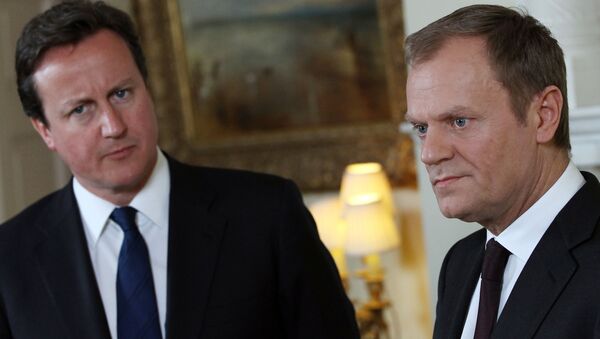Releasing a statement ahead of the December 17-18 European Council meeting, Tusk said that although there was "strong will" to come to an amicable agreement, there were many obstacles in the way.
"Consultations have shown that the issues raised by the British Prime Minister are difficult," Tusk said.
Opposition to Welfare Benefit Restrictions
In particular, Tusk singled out David Cameron's fourth demand to try and restrict EU migrants from accessing in-work benefits and social housing for the first four years of their stay in the UK as a key problem complicating negotiations.
My letter to EU leaders. Need to speed up negotiations to end uncertainty about the future of #UKinEU. https://t.co/MEu8Kd1lvK
— Donald Tusk (@eucopresident) December 7, 2015
"The fourth basket on social benefits and the free movement of persons is the most delicate and will require a substantive political debate at our December meeting," he said, adding that there was no agreement across the bloc.
"While we see good prospects for agreeing on ways to fight abuses and possibly on some reforms related to the export of child benefits, there is presently no consensus on the request that people coming to Britain from the EU must live there and contribute for four years before they qualify for in-work benefits or social housing. This is certainly an issue where we need to hear more from the British Prime Minister and an open debate among ourselves before proceeding further."
A number of countries, headed by Poland, have angrily spoken out against Cameron's proposals, saying that they would veto any attempt to restrict benefits to their citizens.
"We also have to overcome the substantial political differences that we still have on the issue of social benefits and free movement," Tusk said.
Tusk's admission that there is no consensus over Britain's proposed welfare restrictions highlights the significant divide between certain countries within the bloc.
No Deal Before the End of 2015
David Cameron last week admitted that reform negotiations would not be completed by the December meeting as he initially hoped, due to disagreements over British demands, and the increased preoccupation with the Greek debt and refugee crises this year.
In a warning to all parties involved, Tusk said that all member states must take responsibility and "show readiness for compromise" noting that the delays in the process were having a detrimental impact on Britain and the bloc as a whole.
"Uncertainty about the future of the UK in the European Union is a destabilizing factor. That is why we must find a way to answer the British concerns as quickly as possible. In times when geopolitics is back in Europe, we need to be united and strong. This is in our common interest and in the interest of each and every EU Member State," Tusk said.



